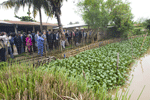Benin: Looking for an effective post-2015 framework for development
Published on Fri, 2012-11-23 14:25
"The MDGs have hardly induced changes and outcomes in Benin" concludes the report from the Social Watch coalition in this West African country, because "the current model based on economic growth at the top does not benefit the majority of the people". After having monitored the implementation of social policies at national, regional and local level for many years, Social Watch-Benin now feels entitled to conclude that in spite of the solemn commitment made by the Millennium Declaration to focus on extreme poverty, "the MDGs have neglected agriculture, which is a key sectors for the poor, because three quarters of the people living in extreme poverty are in rural areas and urban poverty is to a large extent due to the lack of rural development". Gustave Assah, national coordinator of Social Watch-Benin and main author of the report, concludes that "the MDG approach remains essentially quantitative, it does not take into account a multidimensional approach to poverty and it ignores the interdependence between poverty eradication and the reduction of inequalities". Instead of considering redistribution policies, "the logic of the MDGs has essentially favored the development of policies targeting populations located close to the poverty line in order to achieve results fast". In education, for example, poverty remains the main obstacle to achieving the goal of universal education and the main beneficiaries of the policies implemented during the last ten years were "the least poor of the poorest". The MDG targets are evaluated at the national level, without taking into account the great disparities that exist between rural and urban areas. According to Social Watch-Benin, the MDGs were "mostly designed by developed countries without effective participation of the poor countries concerned". The general framework "loses consistency by mixing and placing heterogeneous objectives at the same level". Further, the quantitative approach of the MDGs "has also strongly influenced the operational framework set in place to achieve these objectives, generating a strong external dependence in terms of expertise". The MDGs focus on access at the expense of quality in certain services, such as education. The report concludes that "endogenous development" has been absent from the MDG agenda, and that a new approach should me more qualitative, inclusive and take inequalities into account. A future post-2015 framework should be of universal scope, concludes Social Watch-Benin, with sustainabe development objectives shared by all countries, while goals and targets take into account different levels of development. This new development agenda should integrate the representation of civil society organizations in global governance and take into account all organized actors, public and private, but also consult and fully integrate the concerns of the people living in poverty that frequently lack institutionalized representation. Social Watch-Benin emphasizes the need to diversify the sources of financing of sustainable development, with "greater mobilization of domestic resources, including through tax reform, the development of private funding and innovative financing". The monitoring framework "should be more participatory and transparent than it has been for the MDGs" and in order to increase the accountability of governments, the monitoring system should take into account, together with the reports prepared by government offices and UN agencies, the assessments conducted by non-state development actors and particularly the feedback from the affected populations themselves, channeled through civil socoety organizations. Source
|






